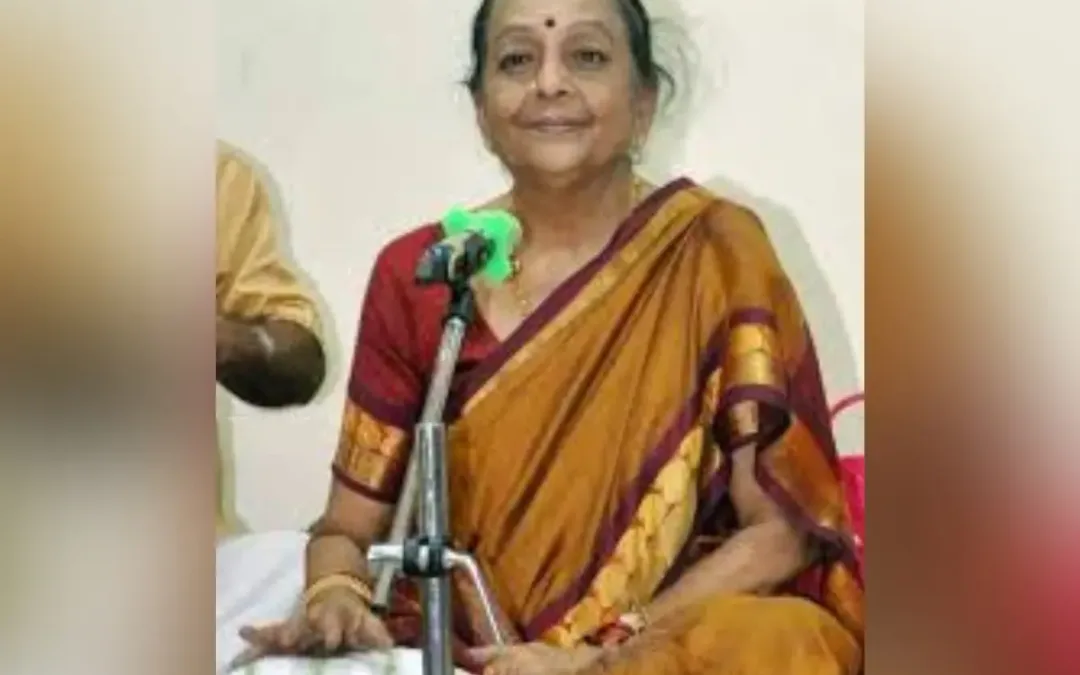Read in : தமிழ்
A saint gave C Saroja and C Lalitha them the name with which they became known to many: Bombay Sisters. Mouna Swamigal of Ambattur who kept eternal silence wrote the name after hearing them perform when they were not so famous. Lalitha passed away on Jan 31, leaving her inseparable sister behind.
Umashankar, their disciple and almost a child for the sisters, told inmathi.com that they got an opportunity to perform when stalwart Madurai Mani Iyer couldn’t fulfill his commitment for a concert at Sai Baba temple in 1963-64. A massive crowd had gathered to hear Mani Iyer. They didn’t go home disappointed. The hit concert was the buzz then and launched Bombay Sisters into the top league.
The sisters relocated from then Bombay to then Madras on a scholarship to learn from Musuri Subramaniya Iyer. Musiri’s main disciple T K Govinda Rao took them under his wings, taught them. He was confident they will become top concert performers.
The Bombay Sisters were worthy successors to the female trinity of Carnatic music. MS, MLV and DKP. When they sang in unison, somehow listeners could hear MS singing. The sisters acknowledged they were a mix of the three doyens.
The sisters cut many records rendering devotional songs, Sanskrit shlokas and sahasranamams to appropriate tunes. The joke in Mylapore was that if one wanted to hear a song about Sivakasi Vertudaiyar Amman, come to Bombay Sisters. Yet, they never compromised on the music. It was always traditional Carnatic music. Common ragas for these songs were Mohanam and Bhegada.
The Bombay Sisters were worthy successors to the female trinity of Carnatic music. MS, MLV and DKP. When they sang in unison, somehow listeners could hear MS singing
The composers included T K Govinda Rao and L Krishnan. The sisters did a lec-dem on Rao’s expertise in setting verses to raga-based tunes.
The sisters were multilingual. Besides the south Indian languages, they also sang in Hindi, Bengali and so on. Shlokas, saptaham, Guruvayoorappan Geetanjali, Kanakadhara Stotram, Kavadi Sindhu, Krishnaleela Tarangini were some of themes of their cassettes. Deities of Lalgudi, Srirangam, Kovur and Tiruvottiyur featured in their songlist.
Also Read: Vani Jairam was every woman’s voice in 10,000 songs
Tiruppavai is popular among singers. But Bombay Sisters released a cassette on Turuvenmbavai.
Unlike others, the sisters passed on opportunities to sing in films since they were asked to perform solo. The sisters always performed as a duet. They did, however, sing the title song in Arunagirinathar starring T M Soundararajan.
Though they taught music, they never gave themselves the position of guru. That position was reserved for stalwarts such as Govinda Rao and Musiri, in their estimate. They were only concert performers, they said.
The sisters set up a charitable trust, Muktambaram, named after their parents, Chidambaram and Muktambal. The trust supported upcoming artistes, sponsoring many of the afternoon concerts at the Krishna GANA Sabha along with the Lalgudi trust
Their husbands and in-laws were a support system. Come festival time, they would be out singing, not at home though. But their families were supportive.
The sisters set up a charitable trust, Muktambaram, named after their parents, Chidambaram and Muktambal. The trust supported upcoming artistes, sponsoring many of the afternoon concerts at the Krishna GANA Sabha along with the Lalgudi trust.
Also Read: As a child, Palani Subbudu watched, learnt, like Ekalaivan
Bombay Sisters’ concerts were marked by attention to laya. Mridangam artistes got enough space. Their violin accompanists were almost always women. Even when performing for free, they always ensured their accompanists were paid.
Their dedication and sincerity was legendary. At the Mylapore Aarkay Convention Center, they did a three hour concert on Dasar Pathangal. There were fewer than a dozen in the audience since it was Margazhi and thousands of concerts were happening. But the sisters treated it as any other concert and satiated their audience.
The sisters were strict traditionalists. They were irritated if any song was sung deviating from tradition. Their sangathis were not too many. They used to say that it should be like salt in food — never too much or too little.
Every day the sisters would go to each other’s house and sing together, rain or shine. The sisters created a record documenting songs sung in weddings so they became standardized and a ready reference.
The sisters learned from H A S Mani, singer Hariharan’s father, when they were in Mumbai.
The sisters received Padma Shri in 2020. The chief secretary of Tamil Nadu personally came to their home and gave the award. The Kalaimamani award was bestowed on them in the year 1992
Umashankar recalls that he approached the sisters to make them his Guru in 1988 but they demurred. They said their performances took all their time and directed him to learn from Needamangalam. But in 1994 they did take him on. Umashankar recalls that at times Saroja would teach him two songs and Lalitha two more songs on the same day. Their repertoire was voluminous.
Read in : தமிழ்











